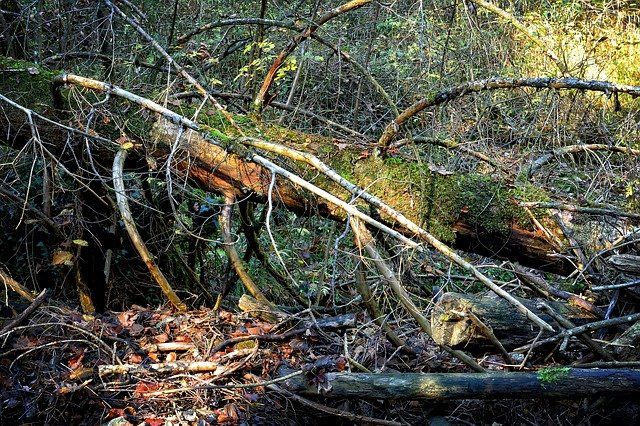
All night the wind howled. The heavy wooden beams of our log house groaned in protest. In the morning I wandered around our property surveying the damage. Broken branches littered the ground.
To the north, the gale had felled a wood-pecker-riddled tree. To the south the wind had snapped off the top half of a Scotch Pine. Not just any Scotch Pine, but our granddaughter’s climbing tree, the one she had loved to climb when she visited.
The crown lay ten feet away in a grove of broken sumacs. On closer inspection I discovered that the wind had broken it off just at the point where an unnoticed canker had weakened the trunk.
Secret sins
A seventy-foot tree over fifty years old — felled so suddenly! The canker is suggestive of the character weaknesses, hurtful habits and secret sins that lurk below the surface of our respectability until exposed by extreme stress.

How easy it is to live from day to day unaware that within our breast may lie a fatal flaw that makes us susceptible to disaster in times of great temptation.
We feel sorrow and outrage when another Christian falls, but we must not feel self-righteous. Instead we should examine ourselves.
Bitter experience taught David the danger of raging at others while being naïve about himself. Nathan’s ringing accusation, ‘Thou art the man’ reverberated in his memory.
And so in Psalm 139:22-23 he pleads, ‘Search me, O God, and know my heart; test me and know my anxious thoughts. See if there is any offensive way in me, and lead me in the way everlasting’.
Failure to recognise sinful attitudes does not mean they are not present. So he wrote, ‘Who can discern his errors? Forgive my hidden faults. Keep your servant also from wilful sins; may they not rule over me’ (Psalm 19:12-13).
The skill of self-deception
Keeping our lives open to God in prayer is the only way to discover the inherent folly within. A verse we often use to describe unbelievers says, ‘The heart is deceitful above all things and beyond cure. Who can understand it? I the Lord search the heart and examine the mind’ (Jeremiah 17:9,10).

Self-deception is a skill we all master early. The seldom-recognised self-sins — self-love, self-confidence, self-serving and even self-doubt — often hide beneath a confident exterior. Self-assurance may run deep, hiding our foibles from our own notice.
Daily submission to the searching and convicting ministry of the Holy Spirit is the only way to protect us from self-deception. Devotional reading of the Scriptures is one way to open our hearts to the Holy Spirit so that he can uncover hidden faults.
We must view Bible reading as an opportunity for God to cast light into the dark recesses of our hearts. Consider, for example, praying through the Beatitudes. ‘Lord, am I humble (poor in spirit)? Do I feel remorse for my sins (mourn)? Am I aggressive, competitive or meek? Do I long more for material things than for righteousness?’
Discovering God’s mercy
In the same way we can ask the Spirit to probe our hearts as we read about the failings of Bible characters, or study the Gospels or meditate on the epistles. Complete openness to passages such as Ephesians 4:32 — ‘Be kind and compassionate to one another, forgiving each other, just as in Christ God forgave you’ — can have a profound cleansing effect.

A reluctance to forgive is a deadly form of self-deception that often lies buried beneath what we think is righteous anger.
Hidden cankers of the soul fester in all of us. Such knowledge may scare us so badly that we sink into depression and despair — or avoid any challenge that might uncover a flaw.
It was not so with David. The more he probed his own sinfulness, the more he discovered God’s mercy and grace. We dare not lance the foul boil of sin without employing the divine ointment of grace. ‘Where sin abounded grace did much more abound.’
Christ’s intercession
So let us not shun self-examination. It might just keep us from spiritual disaster. Peter was confident that he would never deny Christ — but Jesus foresaw his coming denial and said, ‘Satan has asked to sift you as wheat. But I have prayed for you, Simon, that your faith may not fail’(Luke 22:31,32).
Satan tempts us at our weakest point. But Christ intercedes for us that our faith might not fail — even in a hurricane. But if we do fall, what then? My Scotch Pine cannot be restored. It is not even good for firewood.
Not so you and me. No fall we take is so disastrous that the infinite grace of God cannot restore us. No wonder the gospel is such good news!







